MBS to celebrate his palace coup in Washington with Trump, Kushner
By The Wayne Madsen Report
Saudi Crown Prince Mohammed bin Salman, known as "MBS," will lead a large Saudi delegation to Washington this month, undoubtedly to brief Donald Trump and Middle East "special envoy" Jared Kushner, Trump's son-in-law, on the success of his royal palace coup against rival princes within the House of Saud. The MBS-led coup resulted in
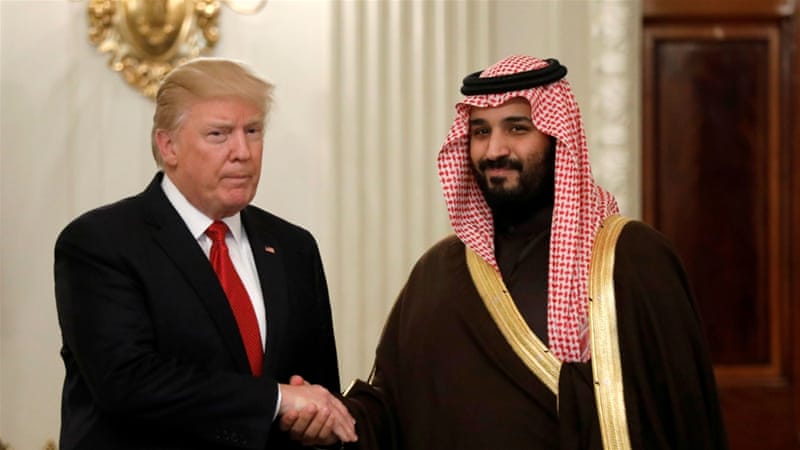 a number of Saudi princes being detained, with an additional two executed on orders from MBS. In his book Fire and Fury, author Michael Wolff wrote that Trump told friends that "we've put our man on top," after MBS's purge of his fellow princes. [To the left, Trump and MBS are seen shaking hands last year in Riyadh].
a number of Saudi princes being detained, with an additional two executed on orders from MBS. In his book Fire and Fury, author Michael Wolff wrote that Trump told friends that "we've put our man on top," after MBS's purge of his fellow princes. [To the left, Trump and MBS are seen shaking hands last year in Riyadh].
The 32-year old MBS is expected to hold more "strategy sessions" with Kushner, like those Kushner and MBS spent together until the early morning hours in Riyadh in October 2017. Some of the discussions also involved Jason Greenblatt, Trump's special adviser on the Middle East and his one-time business lawyer.
Both Kushner and Greenblatt are known to represent the interests of Israeli Prime Minister Binyamin Netanyahu. It is expected that Kushner will push MBS to purchase additional defensive and offensive missile systems from Israel. Saudi Arabia has already obtained missile systems from Israeli firms, including Elbit Systems Ltd. and its American branch, Elbit Systems of America.
It is significant that a key player in Saudi Arabia's arms purchases, Ahmed Al Khateeb, the chairman of Saudi Arabian Military Industries (SAMI), is expected to accompany MBS to Washington. Last November, MBS put SAMI in charge of all Saudi defense acquisitions. Also expected in Washington as part of the Saudi delegation are Lieutenant General Prince Fahd bin Turki bin Abdulaziz, the Commander of Saudi Ground Forces, and Khalid bin Ali Al Humaidan, the chief of the Saudi General Intelligence Directorate (GID).
For Donald Trump, the main issue to be discussed with MBS and his advisers is the listing of Saudi ARAMCO's initial public offering (IPO) with the New York Stock Exchange. Some Saudi officials, including ARAMCO chairman and Saudi Energy Minister Khalid al-Falih, want the IPO to be listed with the London exchange. They point out that a New York exchange IPO would pose a risk to the firm because it could be subjected to lawsuits and potential asset attachments by the families of victims of the September 11, 2001 attacks. ARAMCO President and CEO Amin Nasser has delayed a decision on the ARAMCO IPO listing until later this year. MBS is known to favor the NYSE for the listing but Nasser has also spoken in favor of London and Hong Kong or even Saudi Arabia's own Tadawul exchange in Riyadh. Trump tweeted last November his preference for New York: "Would very much appreciate Saudi Arabia doing their IPO of Aramco with the New York Stock Exchange. Important to the United States!"
It is expected that MBS and his delegation will push the United States to increase its military strikes against Houthi forces in Yemen. U.S. air attacks in Yemen have increased six-fold over those conducted by the Obama administration. The Pentagon insists that the attacks are aimed at forces of the Islamic State in Yemen, which it calls ISIS-Y. In fact, this is a not-so-clever cover story to mask U.S. strikes against Houthi forces.
The Saudi coalition fighting on behalf of a puppet Yemeni government, which has now lost its base in Aden to United Arab Emirates-backed forces of the South Yemen independence al-Hirak al-Janoubi movement, has been caught providing military assistance to jihadists in Yemen. These include Al Qaeda in the Arabian Peninsula (AQAP) and the Pentagon's appellation, ISIS-Y. Other items on the MBS agenda in Washington include the Saudi-led sanctions imposed on Qatar, U.S. support for jihadist remnants in Syria, and increasing economic and diplomatic pressure on Iran and Lebanon, as well as Lebanese Hezbollah. The MBS agenda is virtually a copy of that of Netanyahu, including the desire to stymie lawsuits against Saudi interests by 9/11 victims' families.
 MBS will likely ask Trump for the United States to militarily help put down the South Yemeni "Southern Transitional Council" (STC), the de facto government now ruling South Yemen from Aden. MBS will call these forces, which include socialists and Marxists from the old People's Democratic Republic of [South] Yemen, "terrorists." However, that will result in a final break with the UAE's powerful Crown Prince of Abu Dhabi, Mohammed bin Zayed (MBZ), who supports the South Yemeni separatists.
MBS will likely ask Trump for the United States to militarily help put down the South Yemeni "Southern Transitional Council" (STC), the de facto government now ruling South Yemen from Aden. MBS will call these forces, which include socialists and Marxists from the old People's Democratic Republic of [South] Yemen, "terrorists." However, that will result in a final break with the UAE's powerful Crown Prince of Abu Dhabi, Mohammed bin Zayed (MBZ), who supports the South Yemeni separatists.
If Trump and Kushner decide to heed MBS's call and wade fully into the Yemeni civil war, the already-disastrous human suffering in Yemen will only grow worse. Also, aside from the support it is receiving from the UAE, it will be difficult for the STC to match the lobbying power of the Saudis in Washington. The STC's chief representative in the United States is Summer Ahmed, a Dearborn, Michigan mother, who also works as a lab technician. To beef up the STC's lobbying clout in Washington, the UAE hired Grassroots Political Consulting LLC to promote the interests of the STC in the Congress and White House.
Of interest to anti-fraud watchdog groups and Attorneys General suing the Trump administration for violating the Emoluments Clause of the Constitution -- which forbids a president from accepting money or gifts from foreign sovereigns -- is in what DC hotel the Saudis will stay during their time in Washington.
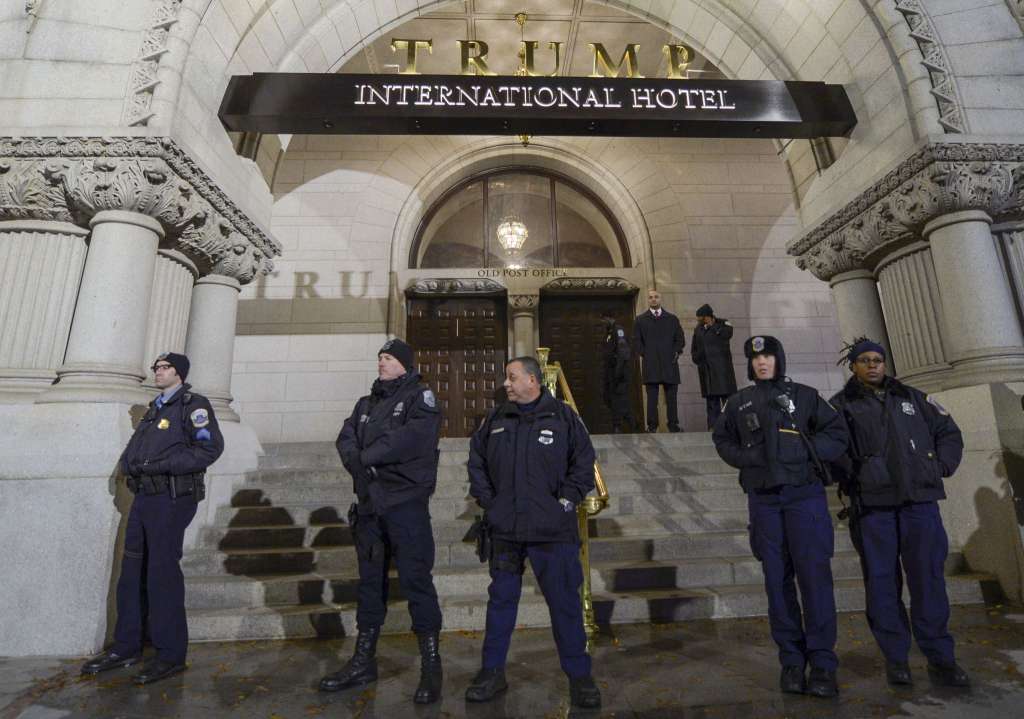 In the past, the Saudis, as well as their Kuwaiti allies, have tended to favor Georgetown's plush Four Seasons Hotel or the downtown Ritz-Carlton. However, this February 26th, the Kuwaitis will hold their National Day celebration at the Trump International Hotel on Pennsylvania Avenue. Last year, not only did the Kuwaitis hold their National Day celebration at the Trump venue but Saudi ally, Bahrain, chose it for their National Day celebration, just following the November 8, 2016 election.
In the past, the Saudis, as well as their Kuwaiti allies, have tended to favor Georgetown's plush Four Seasons Hotel or the downtown Ritz-Carlton. However, this February 26th, the Kuwaitis will hold their National Day celebration at the Trump International Hotel on Pennsylvania Avenue. Last year, not only did the Kuwaitis hold their National Day celebration at the Trump venue but Saudi ally, Bahrain, chose it for their National Day celebration, just following the November 8, 2016 election.
If the Saudi delegation or part of it choose to stay at the Trump-owned hotel, it will provide further proof for lawsuit plaintiffs that Trump is knowingly violating the Emoluments Clause to line his and his family's pockets. And there is every indication that most of the Saudi delegation will stay at the Trump hotel. Last year, MSL Group Americas, a lobbying firm hired by the Saudis to lobby against the Justice Against Sponsors of Terrorism Act or JASTA -- an act that allows families of 9/11 victims to sue Saudi Arabia and its interests -- spent $270,000 at the Trump International Hotel.
Trump previously stated that he would turn over to the U.S. Treasury foreign profits from his hotels to the U.S. Treasury. To date, he has failed to do so.
Both Kushner and Greenblatt are known to represent the interests of Israeli Prime Minister Binyamin Netanyahu. It is expected that Kushner will push MBS to purchase additional defensive and offensive missile systems from Israel. Saudi Arabia has already obtained missile systems from Israeli firms, including Elbit Systems Ltd. and its American branch, Elbit Systems of America.
It is significant that a key player in Saudi Arabia's arms purchases, Ahmed Al Khateeb, the chairman of Saudi Arabian Military Industries (SAMI), is expected to accompany MBS to Washington. Last November, MBS put SAMI in charge of all Saudi defense acquisitions. Also expected in Washington as part of the Saudi delegation are Lieutenant General Prince Fahd bin Turki bin Abdulaziz, the Commander of Saudi Ground Forces, and Khalid bin Ali Al Humaidan, the chief of the Saudi General Intelligence Directorate (GID).
For Donald Trump, the main issue to be discussed with MBS and his advisers is the listing of Saudi ARAMCO's initial public offering (IPO) with the New York Stock Exchange. Some Saudi officials, including ARAMCO chairman and Saudi Energy Minister Khalid al-Falih, want the IPO to be listed with the London exchange. They point out that a New York exchange IPO would pose a risk to the firm because it could be subjected to lawsuits and potential asset attachments by the families of victims of the September 11, 2001 attacks. ARAMCO President and CEO Amin Nasser has delayed a decision on the ARAMCO IPO listing until later this year. MBS is known to favor the NYSE for the listing but Nasser has also spoken in favor of London and Hong Kong or even Saudi Arabia's own Tadawul exchange in Riyadh. Trump tweeted last November his preference for New York: "Would very much appreciate Saudi Arabia doing their IPO of Aramco with the New York Stock Exchange. Important to the United States!"
It is expected that MBS and his delegation will push the United States to increase its military strikes against Houthi forces in Yemen. U.S. air attacks in Yemen have increased six-fold over those conducted by the Obama administration. The Pentagon insists that the attacks are aimed at forces of the Islamic State in Yemen, which it calls ISIS-Y. In fact, this is a not-so-clever cover story to mask U.S. strikes against Houthi forces.
The Saudi coalition fighting on behalf of a puppet Yemeni government, which has now lost its base in Aden to United Arab Emirates-backed forces of the South Yemen independence al-Hirak al-Janoubi movement, has been caught providing military assistance to jihadists in Yemen. These include Al Qaeda in the Arabian Peninsula (AQAP) and the Pentagon's appellation, ISIS-Y. Other items on the MBS agenda in Washington include the Saudi-led sanctions imposed on Qatar, U.S. support for jihadist remnants in Syria, and increasing economic and diplomatic pressure on Iran and Lebanon, as well as Lebanese Hezbollah. The MBS agenda is virtually a copy of that of Netanyahu, including the desire to stymie lawsuits against Saudi interests by 9/11 victims' families.
 MBS will likely ask Trump for the United States to militarily help put down the South Yemeni "Southern Transitional Council" (STC), the de facto government now ruling South Yemen from Aden. MBS will call these forces, which include socialists and Marxists from the old People's Democratic Republic of [South] Yemen, "terrorists." However, that will result in a final break with the UAE's powerful Crown Prince of Abu Dhabi, Mohammed bin Zayed (MBZ), who supports the South Yemeni separatists.
MBS will likely ask Trump for the United States to militarily help put down the South Yemeni "Southern Transitional Council" (STC), the de facto government now ruling South Yemen from Aden. MBS will call these forces, which include socialists and Marxists from the old People's Democratic Republic of [South] Yemen, "terrorists." However, that will result in a final break with the UAE's powerful Crown Prince of Abu Dhabi, Mohammed bin Zayed (MBZ), who supports the South Yemeni separatists. If Trump and Kushner decide to heed MBS's call and wade fully into the Yemeni civil war, the already-disastrous human suffering in Yemen will only grow worse. Also, aside from the support it is receiving from the UAE, it will be difficult for the STC to match the lobbying power of the Saudis in Washington. The STC's chief representative in the United States is Summer Ahmed, a Dearborn, Michigan mother, who also works as a lab technician. To beef up the STC's lobbying clout in Washington, the UAE hired Grassroots Political Consulting LLC to promote the interests of the STC in the Congress and White House.
Of interest to anti-fraud watchdog groups and Attorneys General suing the Trump administration for violating the Emoluments Clause of the Constitution -- which forbids a president from accepting money or gifts from foreign sovereigns -- is in what DC hotel the Saudis will stay during their time in Washington.
 In the past, the Saudis, as well as their Kuwaiti allies, have tended to favor Georgetown's plush Four Seasons Hotel or the downtown Ritz-Carlton. However, this February 26th, the Kuwaitis will hold their National Day celebration at the Trump International Hotel on Pennsylvania Avenue. Last year, not only did the Kuwaitis hold their National Day celebration at the Trump venue but Saudi ally, Bahrain, chose it for their National Day celebration, just following the November 8, 2016 election.
In the past, the Saudis, as well as their Kuwaiti allies, have tended to favor Georgetown's plush Four Seasons Hotel or the downtown Ritz-Carlton. However, this February 26th, the Kuwaitis will hold their National Day celebration at the Trump International Hotel on Pennsylvania Avenue. Last year, not only did the Kuwaitis hold their National Day celebration at the Trump venue but Saudi ally, Bahrain, chose it for their National Day celebration, just following the November 8, 2016 election. If the Saudi delegation or part of it choose to stay at the Trump-owned hotel, it will provide further proof for lawsuit plaintiffs that Trump is knowingly violating the Emoluments Clause to line his and his family's pockets. And there is every indication that most of the Saudi delegation will stay at the Trump hotel. Last year, MSL Group Americas, a lobbying firm hired by the Saudis to lobby against the Justice Against Sponsors of Terrorism Act or JASTA -- an act that allows families of 9/11 victims to sue Saudi Arabia and its interests -- spent $270,000 at the Trump International Hotel.
Trump previously stated that he would turn over to the U.S. Treasury foreign profits from his hotels to the U.S. Treasury. To date, he has failed to do so.

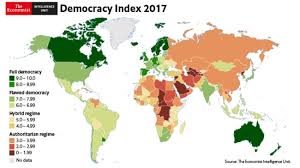 Thanks to the actions of the Trump administration, the United States fared even worse in the Index for 2017. The United States is still ranked as a "flawed democracy," but the actions of Trump to circumvent the powers of the legislative and judicial branches, as well as curtail the independence of the Justice Department and Federal Bureau of Investigation, have placed the nation at risk of dropping further in the annual index for 2018 to a "hybrid regime." The Economist Intelligence Unit, which calculates the annual Democracy Index, rates nations as falling into four categories: full democracy, flawed democracy, hybrid regime, and authoritarian regime.
Thanks to the actions of the Trump administration, the United States fared even worse in the Index for 2017. The United States is still ranked as a "flawed democracy," but the actions of Trump to circumvent the powers of the legislative and judicial branches, as well as curtail the independence of the Justice Department and Federal Bureau of Investigation, have placed the nation at risk of dropping further in the annual index for 2018 to a "hybrid regime." The Economist Intelligence Unit, which calculates the annual Democracy Index, rates nations as falling into four categories: full democracy, flawed democracy, hybrid regime, and authoritarian regime.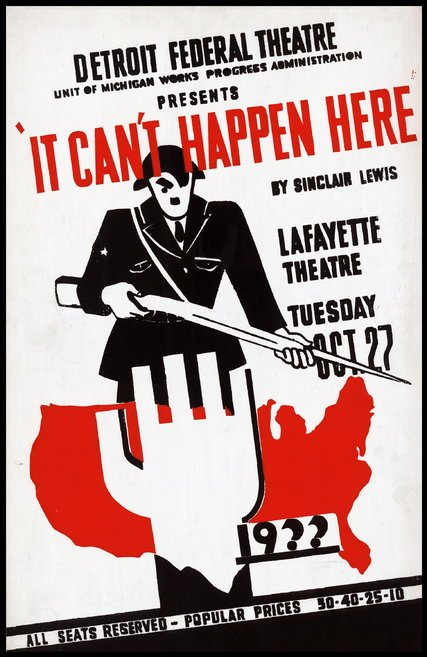
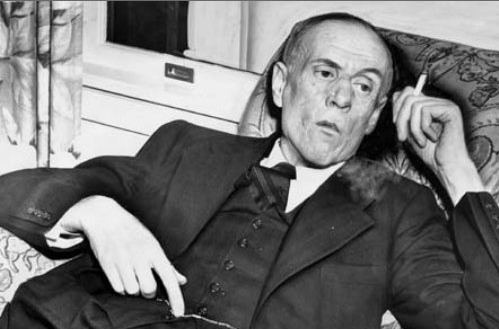 The writer Sinclair Lewis, author of Elmer Gantry and Main Street, [pictured, left] could have had someone like Donald Trump in mind when, in 1935, he published his best-selling novel It Can't Happen Here. In 1936, the novel was adapted into a play with the same title. The novel's chief protagonist is journalist Doremus Jessup, a reporter for the Fort Beulah, Vermont Daily Informer, an old-school liberal newspaper. Jessup helps lead the opposition to an authoritarian "populist" president named Berzelius "Buzz" Windrip.
The writer Sinclair Lewis, author of Elmer Gantry and Main Street, [pictured, left] could have had someone like Donald Trump in mind when, in 1935, he published his best-selling novel It Can't Happen Here. In 1936, the novel was adapted into a play with the same title. The novel's chief protagonist is journalist Doremus Jessup, a reporter for the Fort Beulah, Vermont Daily Informer, an old-school liberal newspaper. Jessup helps lead the opposition to an authoritarian "populist" president named Berzelius "Buzz" Windrip.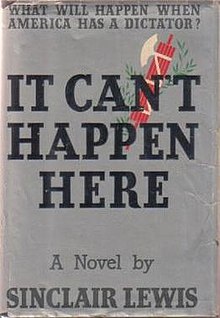
 the Land, starring Jackie Cooper, John Forsythe, and Gene Hackman, and Carol Lynley. Also titled, United States: It Can't Happen Here, the series pilot was aired as a made-for-television movie but the rest of the series' production run was canceled. As with the 1936 movie, there was reason to believe that right-wing elements in the United States -- including FBI director J. Edgar Hoover -- objected to the "anti-fascism" nature of the production. In 1982, a TV series based on Lewis's novel, titled Storm Warnings, was presented to NBC, which rejected the premise of a fascist takeover of the United States. NBC only bought off on the series after American fascists were recast as human-consuming reptilian extraterrestrials and the name of the series was changed to V.
the Land, starring Jackie Cooper, John Forsythe, and Gene Hackman, and Carol Lynley. Also titled, United States: It Can't Happen Here, the series pilot was aired as a made-for-television movie but the rest of the series' production run was canceled. As with the 1936 movie, there was reason to believe that right-wing elements in the United States -- including FBI director J. Edgar Hoover -- objected to the "anti-fascism" nature of the production. In 1982, a TV series based on Lewis's novel, titled Storm Warnings, was presented to NBC, which rejected the premise of a fascist takeover of the United States. NBC only bought off on the series after American fascists were recast as human-consuming reptilian extraterrestrials and the name of the series was changed to V.